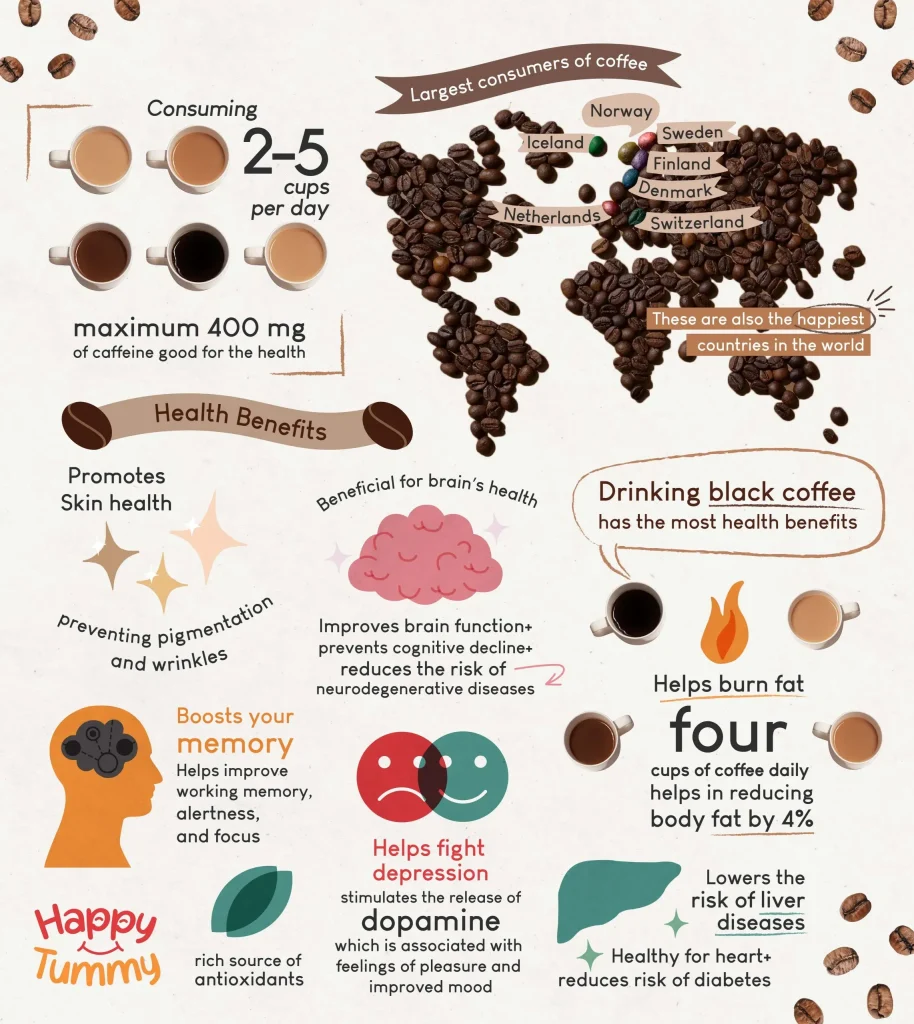The health benefits of coffee have gained significant attention in recent years, as studies reveal its potential to support longevity and improve overall well-being. Drinking coffee might not only fuel your morning routine but also play a crucial role in enhancing heart health and combating age-related diseases. Research indicates that caffeine, a primary ingredient in coffee, significantly influences cell growth and stress response, paving the way for its protective benefits against conditions like diabetes and dementia. Regular coffee consumption has also been linked to improved cognitive function and a lower risk of chronic illnesses, making it a valuable addition to a balanced diet. With its rich blend of antioxidants and vital nutrients, coffee emerges as a promising ally for those seeking to enhance their health throughout the aging process.
Exploring the myriad advantages of coffee reveals its significance beyond just a morning ritual. This beloved beverage is not only a pick-me-up but also a powerful source of antioxidants and essential compounds that contribute to improved heart health and longevity. Evidence is mounting that moderate coffee intake can reduce the risk of debilitating health issues such as type 2 diabetes and depression while promoting better metabolic function. Moreover, the stimulating effects of caffeine, coupled with polyphenols found in coffee, provide a dual mechanism that could help fend off the effects of aging. As researchers delve deeper into the effects of coffee consumption, its role in promoting health and vitality becomes increasingly evident.
The Health Benefits of Coffee
Regular coffee consumption has been linked to numerous health benefits that contribute to overall well-being. Studies indicate that coffee drinkers may experience a reduced risk of serious diseases such as type 2 diabetes, Alzheimer’s, and heart disease. The presence of antioxidants, particularly polyphenols, in coffee helps protect cells from oxidative stress and promotes healthy cell function. This protective factor is complemented by the energizing effects of caffeine, which can enhance physical performance and mental alertness.
Moreover, coffee’s role in enhancing longevity is gaining traction as scientific research continues to unveil its multitude of health benefits. Previous research has revealed that individuals who enjoy two to three cups of coffee daily are likely to experience greater heart health, significantly lowering their risk for cardiac-related deaths. The stimulating effects of caffeine activate cellular mechanisms that promote longevity and cellular repair, ensuring our bodies remain resilient against aging.
Coffee and Aging: How Caffeine Impacts Longevity
Caffeine appears to play a crucial role in combating the effects of aging, particularly through its involvement in cellular repair processes. Research conducted by the Queen Mary University in London has indicated that caffeine can trigger the activation of AMPK, an enzyme crucial for energy regulation within cells. As cells age, they lose efficiency in energy metabolism, making them more susceptible to degenerative conditions. By activating AMPK, caffeine helps cells to maintain their energy levels and repair damage more effectively, promoting healthier aging.
Furthermore, the relationship between coffee and aging extends beyond cellular function to influence overall health outcomes. The consumption of coffee has been linked to lower incidents of chronic diseases that typically afflict the aging population. For instance, caffeine’s neuroprotective properties significantly lower the risk of developing neurodegenerative diseases such as dementia. This suggests that moderate coffee consumption might not only extend lifespan but also enhance the quality of life as individuals age.
Coffee and Heart Health: A Connection Beyond Taste
The effects of coffee on heart health are multifaceted, presenting both positive benefits and potential risks. Several studies have demonstrated that moderate coffee consumption can be associated with a reduced risk of heart disease, attributed to coffee’s anti-inflammatory and antioxidant properties. As cardiovascular health is essential, the protective benefits of coffee could be linked to its ability to improve blood vessel function and lower inflammation, alleviating the burden of heart-related issues.
Conversely, excessive coffee intake may exacerbate heart health risks due to increased blood pressure and potential heart rhythm disturbances. The NHS advises caution with high coffee consumption, highlighting that exceeding four cups per day could lead to undesirable health effects. Therefore, understanding the balance between enjoying coffee for its health benefits while recognizing the potential risks is crucial for maintaining optimal heart health.
The Link Between Coffee Consumption and Mental Health
Research has increasingly linked coffee consumption to various aspects of mental health, particularly in reducing the risk of depression. The caffeine in coffee stimulates neurotransmitter function, notably serotonin and dopamine, which play a significant role in regulating mood. Studies have shown that individuals who consume coffee regularly experience lower rates of depression compared to non-coffee drinkers, potentially due to the combined influence of caffeine and the antioxidants found in coffee.
However, the relationship between coffee and mental health is complex. While moderate consumption may enhance mood and cognitive function, excessive intake can lead to anxiety and jitteriness, especially in susceptible individuals. Striking a balance is essential, as consuming coffee in moderation can provide mental health benefits without the downsides associated with overconsumption.
The Role of Polyphenols in Coffee’s Health Benefits
Coffee is not just a source of caffeine; it is also rich in polyphenols, which are natural compounds with antioxidant properties. These polyphenols play a critical role in protecting cells from damage caused by free radicals, thereby contributing to overall health. Studies have indicated that the antioxidants found in coffee can enhance cellular function and potentially reduce the risk of chronic diseases, including cancer and cardiovascular diseases. Polyphenols may also improve insulin sensitivity, further linking coffee consumption to reduced diabetes risk.
Moreover, the concentration of antioxidants varies with coffee type and preparation method, with darker roasts generally providing more health benefits due to higher levels of certain polyphenols. Research continues to explore the different health effects of various coffee forms, emphasizing the need for coffee enthusiasts to savor their beverage not just for its stimulating effects but also for its rich health-promoting properties.
How Coffee Supports Healthy Weight Management
Caffeine, a key component of coffee, has been widely recognized for its role in supporting metabolism and weight management. By enhancing thermogenesis—the body’s process of generating heat and energy from digesting food—caffeine can help increase calorie expenditure. Studies indicate that individuals who consume coffee regularly may find it easier to maintain a healthy weight, as the stimulating effects of caffeine may enhance workout performance and promote higher activity levels.
Incorporating coffee into a balanced diet can also assist in managing cravings and reducing appetite. The unique blend of chemicals in coffee can help regulate hunger hormones, making it easier for individuals to resist the temptation of snacking excessively. However, it is pivotal to pair coffee consumption with a healthy lifestyle for the best results, as excessive sugar and cream can negate these benefits.
The Importance of Moderation in Coffee Consumption
While coffee offers numerous health benefits, moderation is key to reaping positive effects without experiencing negative consequences. Health authorities recommend that most adults can safely consume up to four cups of coffee a day, highlighting that exceeding this amount can lead to increased health risks, including anxiety, insomnia, and elevated heart rates. Understanding one’s tolerance to caffeine is crucial, as individual responses can vary significantly.
For those who enjoy coffee, adopting a mindful approach to consumption can enhance its benefits. Being aware of the effects that caffeinated beverages have on your body—like how much sleep you are getting or any anxiety you may be experiencing—will help you find a balance that maximizes its health benefits, such as improved focus and boosted energy levels, while minimizing potential downsides.
Research Insights: Coffee and Disease Prevention
Recent studies have illuminated the potential of coffee as an ally in disease prevention. Evidence suggests that moderate coffee consumption could significantly lower the risk of various diseases, including serious conditions like type 2 diabetes, Alzheimer’s disease, and cardiovascular problems. The cumulative data demonstrate that the health benefits of coffee consumption can extend beyond mere caffeine intake, as other components, such as polyphenols, play significant roles in disease mitigation and overall health.
Through ongoing research efforts, scientists have begun to explore the underlying mechanisms by which coffee produces its protective health effects. Unraveling these pathways is crucial, not only for understanding coffee’s role in human health but also for potentially developing new therapeutic strategies that harness the protective power of coffee-related compounds against chronic diseases.
Future Research Directions on Coffee’s Impact on Health
The evolving research landscape around coffee suggests promising avenues for future studies that could further elucidate its impact on health. Scientists aim to explore how various brewing methods, types of coffee beans, and consumption patterns might influence health outcomes. As our understanding of coffee deepens, researchers will focus on identifying specific compounds that offer health benefits and how these can be optimized in dietary recommendations.
Moreover, as health guidelines are increasingly influenced by scientific evidence, future research may lead to more personalized coffee consumption recommendations. Understanding individual genetics and lifestyle factors may help in tailoring the health benefits of coffee to suit diverse populations, making it a more integral part of an individual’s health regimen.
Frequently Asked Questions
What are the health benefits of coffee related to longevity?
Research suggests that drinking coffee may enhance longevity due to its ability to stimulate AMPK, an energy restoration system in cells. This process aids in cellular repair, slows aging, and protects against age-related diseases like dementia and diabetes, potentially extending lifespan.
How does coffee consumption affect heart health?
Numerous studies indicate that regular coffee consumption is associated with better heart health. Drinking two to three cups of coffee daily can reduce the risk of cardiac death by nearly 20%. The antioxidants and anti-inflammatory properties in coffee contribute to this heart health benefit.
What are the cognitive benefits of caffeine?
Caffeine, a major component of coffee, may enhance cognitive function by protecting the brain and improving mental alertness. Studies show that moderate caffeine intake is linked to a decreased risk of dementia and may support overall brain health as we age.
Can coffee help in combating depression and anxiety?
Yes, regular coffee consumption has been linked to a reduced risk of depression. The stimulating effects of caffeine can improve mood and mental health, making it a potential ally in the fight against anxiety and depressive disorders.
What impact does coffee have on aging and cellular health?
Coffee has been shown to promote slower aging processes through its role in activating AMPK, which contributes to better DNA repair and stress responses. These factors are critical for maintaining cellular health and potentially reducing age-related diseases.
What are the risks associated with high coffee consumption?
While coffee has health benefits, excessive consumption—over four cups a day—can elevate blood pressure and increase risks for heart disease and certain cancers. It’s essential to enjoy coffee in moderation to maximize benefits and minimize health risks.
Is there a link between coffee consumption and type 2 diabetes?
Yes, studies indicate that moderate coffee consumption may lower the risk of developing type 2 diabetes. The presence of antioxidants and other beneficial compounds in coffee contributes to improved insulin sensitivity and metabolic health.
How does coffee affect weight management?
Coffee may aid in weight management by boosting metabolism and supporting fat loss. Its caffeine content can enhance physical performance and promote an active lifestyle, which is beneficial for maintaining a healthy weight.
| Key Points |
|---|
| Coffee may help prolong life and combat major diseases like dementia, diabetes, and heart failure. |
| Caffeine activates AMPK, promoting cell protection and repair, potentially affecting aging and disease resistance. |
| Moderate coffee consumption is associated with numerous health benefits including reduced risk of type 2 diabetes and heart disease. |
| Excessive consumption (>4 cups/day) can lead to negative effects like increased blood pressure and certain health risks. |
Summary
The health benefits of coffee are becoming increasingly apparent, with research suggesting that moderate consumption can promote longevity and protect against serious diseases. Studies indicate that caffeine, a key component in coffee, may activate cellular mechanisms that improve cell health and longevity. Additionally, regular coffee drinkers have been found to experience lower risks of various health issues, including type 2 diabetes and heart disease. While excessive intake can lead to health risks, enjoying coffee in moderation can be part of a healthy lifestyle. As more research unfolds, coffee continues to demonstrate its potential as a significant ally in promoting long-term health.



